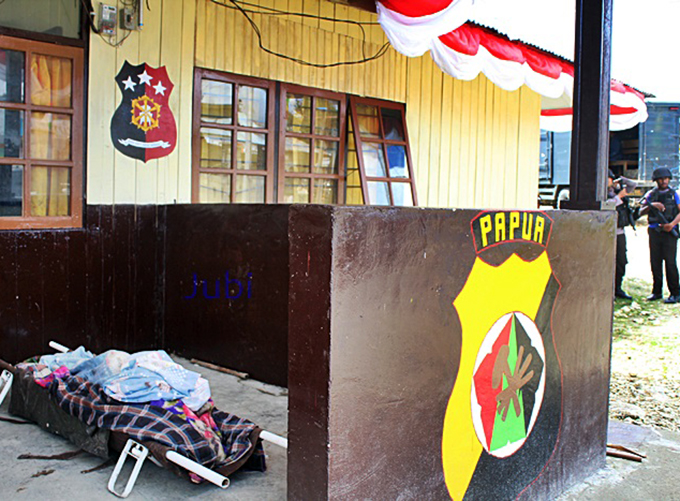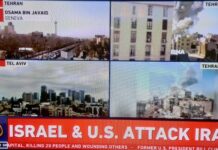
ANALYSIS: By Hipolitus Yolisandry Ringgi Wangge in Jakarta
Reports about the shooting of an indigenous Papuan by police officers early this month in Deiyai district, Papua, have renewed focus on how human rights abuses by security officials in the region remain unaddressed by the government of President Joko “Jokowi” Widodo.
Accounts of what triggered the incident differ, although most suggest it began when workers at a construction company refused to take a near-drowned villager to the hospital. The villager’s relatives and other local residents protested and a scuffle broke out. Police and military officials arrived and, according to an eyewitness, opened fire on the crowd without firing any warning shots. This left one man, Yulianus Pigai, dead, and 16 other Papuans wounded, including children.
Local police claimed Mobile Brigade (Brimob) personnel only used rubber bullets to disperse the crowd. But a relative of one of the injured residents has posted photos on social media of real bullet casings, allegedly used by police.
Despite government pledges to change the approach to the region, violence against indigenous Papuans at the hands of security forces has continued unabated. Hundreds of thousands of military and police officials have been deployed to the region. The government justifies this security presence for three main reasons: The first is to secure so-called national assets, such as the massive Freeport McMoran mine. The second is to respond to the Free Papua Movement (OPM), and other small-scale organisations agitating for independence. The third is to prevent and address horizontal conflict between non-indigenous and indigenous Papuans, and among Papuan tribes.
The shooting has also highlighted the lack of policy coherence of the Jokowi administration. Since Jokowi took over from Susilo Bambang Yudhoyono in 2014, the government has initiated several economic policies, including establishing massive infrastructure projects, and implementing a one-fuel price policy, which aim, among other things, to improve economic development in Papua.
On the political front, Jokowi granted clemency to five Papuan political prisoners in 2015. Human Rights Watch researcher Andreas Harsono recently reported Jokowi has been quietly releasing dozens more over the past year. In his first nearly three years in power, he has visited the two Papuan provinces far more often than his predecessors. Yet none of these efforts have had much of an impact on the central problem in Papua, which is one of human rights.
Jokowi does not appear to have any clear design for addressing violations of human rights in Papua, or across the country more broadly. About the same time as the shooting, for example, police officers dispersed a workshop convened by the Indonesian People’s Tribunal on the 1965 violence – a reminder of how quickly Jokowi’s plans for reconciliation for past human rights abuses have unravelled.
Lack of justice
Scholars argue ethno-nationalist protests can gather steam when the government is resistant to holding human rights violators – particularly state security officials – to account through the courts. This lack of justice results in deep trauma for victims’ families and increases public mistrust of the central government. This, in turn, enables political actors to mobilise the people to express aspirations for independence, as has happened in Papua.
There are two basic problems within the government approach to human rights in Papua. First, institutions and approaches are poorly coordinated. This is an old and unresolved problem that the Indonesian government has faced since it initiated structural reforms in the early 2000s. For years, government institutions, in particular, the Coordinating Ministry for Legal, Political, and Security Affairs, the Home Affairs Ministry, the Foreign Affairs Ministry, the National Police (Polri) and the Indonesian Military (TNI), have promoted different and sometimes inconsistent policies to deal with problems in Papua.
Luhut Panjaitan, former coordinating minister for legal, political, and security affairs, formed an integrated working group to find a solution to three of the most concerning human rights cases: the 2014 Paniai shootings, the 2001 Wamena incident, and the 2003 Wasior incident. However, when former General Wiranto succeeded Luhut in 2016, the team was dismissed, and there have been no follow-up activities to address these crucial issues. Wiranto recently claimed the shooting in Deiyai was not a human rights violation.
Further evidence of this inconsistent approach is Jokowi’s 2015 promise to lift restrictions on foreign journalists reporting from Papua. There have still not been any specific policies introduced to implement this directive. Any foreign journalist who wishes to go to Papua must still undertake a complicated application process and follow strict requirements, particularly from security-related agencies and, occasionally, the Ministry of Foreign Affairs.
A comprehensive human rights policy – not an economic policy – should be the priority for resolving the issues in Papua. Economic policy has been the prescription favoured by every Indonesian president to address problems in Papua. They seem to believe aspirations for independence are simply a function of the poor quality of life of many indigenous Papuans, and improving welfare will lead to these demands fading.
In reality, the situation is far more complex. Papuans’ trust issues with the central government do not stem from poverty. Rather, they result from the insecurity of living with the threat of violence from the security officers who surround them, a massive presence that in itself contributes to trauma. In addition, the stagnation of internal reforms in the police and TNI which might make them better able to deal with low-level conflicts and protests in Papua without violence has made a bad situation worse.
Indigenous Papuans will continue to be killed as long as the central government lacks the political will or capacity to better coordinate national institutions and prioritise human rights issues in Papua.
Hipolitus Yolisandry Ringgi Wangge is a researcher at the Marthinus Academy in Jakarta. His current research focuses on democratisation in developing countries, particularly the role of crucial actors such as the military during democratic transition and consolidation. He has conducted fieldwork in West Papua on the role of Papuan youth in political and cultural identity during the special autonomy era. This article is republished by Asia Pacific Report with the author’s permission.












































